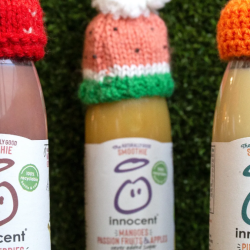I’d say it’s pretty clear that we need to change our behaviour to live in better balance with our beautiful planet. Let’s look at a few ways that behavioural science can help us take less and give more.
Mouthwatering words
We need to sell the behaviours that support the planet.
Generally, when you sell a product , what do you focus on? Most likely, it’s the benefits for your customer. You make it as attractive as possible, helping people to picture how much better life would be if only they had your trainers/deodorant/beans.
But strangely, this approach frequently goes out of the window when it comes to selling eco-friendly products.
Too often, we fixate on carbon-reduction, healthiness or other virtues. The marketing becomes all about the worthiness of the product. Might it work better if we stick to tried and tested techniques, and simply make the desired behaviour or product super-appealing?
Evidence suggests so — starting with the words you use to describe your product. In 2019, The Behavioural Insights Team (BIT) and The World Resource Institute (WRI) set out to explore the impact that language would have on meat eaters’ likelihood of ordering a vegetarian dish.

2,000 participants saw different menus, each containing one vegetarian dish and four meat dishes. The name of the vegetarian dish was varied. Each person saw one random name from five alternatives (e.g. meat-free breakfast, garden breakfast, field-grown breakfast etc.). They were asked which item they would order.
Results showed that indulgent language (e.g. ‘mild and sweet’, ‘comforting’) and terms highlighting provenance (‘field grown’, ‘garden’) boosted the selection of vegetarian dishes. In contrast, ‘meat-free’ was consistently unpopular.
This is a really simple way to get people doing more of what’s good for the planet. You don’t have to worry about whether your customers are even aware that they are ‘doing the right thing‘ — as long as they are.
So, make your eco-options the most attractive without necessarily boasting about their planet-saving credentials. Yes, it’s incredibly hard to resist highlighting the meat-free/low carbon/recycled etc aspects. But I would urge you to try it and see what happens — eco-messaging may not sell…
Because at the end of the day, it’s what individuals actually do that matters. Worthy claims won’t save the planet.
Keeping up with the solars
Behavioural science offers many other ways to boost attractiveness. Everyone in marketing knows the idea of social proof — we humans are heavily influenced by what those around us are doing.
So it’s perhaps unsurprising that there’s research to show the strongest predictor of a household going solar is the number of neighbours with visible rooftop panels.
The study was conducted by Marcello Graziano and Kenneth Gillingham in 2015, who looked at solar panel installation in Connecticut, US. They spotted clear ‘clustering’ of solar adoption. It wasn’t just that people of the same demographic were interested in solar power, the panels had to be seen from the street to have the boosting effect.

The implication is clear for changing eco-behaviour — for anything we want to encourage, make it as visible as possible, and it immediately becomes a more appealing option. It’s a tactic being used to encourage electric cars, with their number plates featuring a green stripe of honour.
Not every behaviour is quite as visible as solar panels or green stripes, but can you think of lateral ways to let people showcase their planet-positive behaviours? Something as small as a car sticker could help a behaviour catch on.
More meat-free meals?
There’s a subtle variation on the theme of social proof that might further boost the appeal of environmentally-friendly behaviours. It’s called dynamic social proof. That’s the idea of publicising that a behaviour, rather than just being ‘popular’, is ‘on the rise.’
It’s accepted now that cutting meat consumption — especially beef — is one of the most impactful ways to reduce your carbon footprint. And evidence shows that dynamic social proof could help boost this behaviour.
A 2017 study by Stanford University psychologists, Gregg Sparkman and Gregory Walton, compared the impact of static versus dynamic norms in encouraging people to eat less meat.
They displayed one of two statements in a café:
Static: ‘Recent research has shown that 30% of Americans make an effort to limit their meat consumption. That means that 3 in 10 people eat less meat than they otherwise would.‘
Dynamic: ‘Recent research has shown that, in the last five years, 30% of Americans have now started to make an effort to limit their meat consumption. That means that, in recent years, 3 in 10 people have changed their behaviour and begun to eat less meat than they otherwise would.‘
Customers who read the dynamic message were significantly more likely to order a meatless meal (34%) than those who read the static norm message (17%). Dynamic norms messaging can really help when you haven’t quite got the numbers to claim that a majority of people are taking the desired action. At this stage, it might be more about promoting positive changes, so that people believe they are part of a new movement.
At the end of the day, it’s what individuals actually do that matters. So let’s focus on applying psychology as effectively for environmentally beneficial products and initiatives as we do for the more damaging goods. And let behavioural science help us live in better balance with the planet.
Featured image: Fahroni / Canva


































